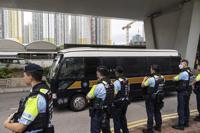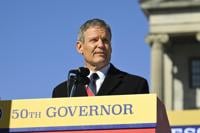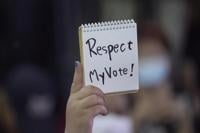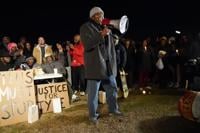HONG KONG (AP) — Two British judges have resigned from Hong Kong’s top court, the city’s judiciary said, deepening worries over the city's rule of law under a Beijing-imposed national security law.
The judiciary said in a statement Thursday that Jonathan Sumption and Lawrence Collins, who both serve as non-permanent overseas judges of Hong Kong's Court of Final Appeal, have tendered their resignations to the city leader. But it did not give further details about their decisions.
Collins told The Associated Press that his resignation was “because of the political situation in Hong Kong." But he said he continues "to have the fullest confidence in the court and the total independence of its members.”
Sumption said he would make a statement next week.
Hong Kong's Chief Justice Andrew Cheung noted their decisions with regret in a statement, reiterating the judiciary's commitment to upholding the rule of law and judicial independence in the city.
Hong Kong, a former British colony, is a common law jurisdiction, unlike mainland China. After it returned to Chinese rule in 1997, non-permanent overseas judges have consistently served on the city's top court.
The pair’s resignations are an indicator of confidence in the city’s rule of law and judicial independence, especially after the enactment of the 2020 national security law that has all but wiped out public dissent. Many pro-democracy activists have been arrested under the law, including some of the city's best-known democracy advocates.
Last week, a Hong Kong court of conspiring to commit subversion in what was the city's biggest national security case to date. They were who were accused of attempting to paralyze Hong Kong’s government and topple the city’s leader by securing the legislative majority necessary to indiscriminately veto budgets.
Critics said the convictions showed how the sweeping security law is being used against dissidents in the city. But Beijing and Hong Kong governments insisted the law helped bring back stability to the city following huge anti-government protests in 2019. Hong Kong officials have repeatedly insisted the city's judicial independence is being protected.
In March, the Hong Kong government enacted a , raising more concerns over the city's erosion of freedoms.
Hong Kong's leader John Lee expressed regrets over the judges' resignations in a statement. Lee maintained the human rights and freedoms guaranteed by the law have not changed, nor has the territory's judicial independence.
The city's bar association said it strongly believes that their departure would not affect the ability of the apex court in discharging its judicial functions, adding it has “every confidence” in the independence of the city's judicial system.
The two judges' resignations are not the first in the city. Months after the security law was enacted in June 2020, Australian judge James Spigelman told Australia’s national broadcaster that he quit the city's top court for reasons “related to the content of the national security legislation."
In 2021, British judge Baroness Brenda Hale also said she would quit the city's highest court when her first term ended. But she said her decision had nothing to do with the situation in Hong Kong, according to the South China Morning Post.
In 2022, two other British judges, Robert Reed and Patrick Hodge, stepped down too. At that time, Reed said he agreed with the British government that judges of the U.K. Supreme Court “cannot continue to sit in Hong Kong without appearing to endorse an administration which has departed from values of political freedom, and freedom of expression.”
On Friday, both Sumption and Collins were listed as former judges on the top court's website. Eight overseas non-permanent judges still serve on the highest court.
When the top court hears a case, it typically involves five judges — the chief justice, three permanent judges and one non-permanent Hong Kong judge or one non-permanent overseas judge.
The government previously said the presence of these overseas jurists helped maintain high confidence in the judicial system and enabled the financial hub to maintain strong links with other common law jurisdictions.
Following the latest departures, Cheung, the chief justice, said suitable candidates from overseas common law jurisdictions will continue to be appointed to the court as non-permanent judges and the court's operation will not be affected by any membership change.










































